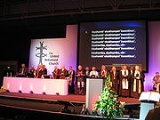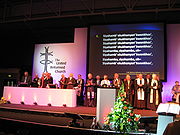
Siyahamba
Encyclopedia

Zulu language
Zulu is the language of the Zulu people with about 10 million speakers, the vast majority of whom live in South Africa. Zulu is the most widely spoken home language in South Africa as well as being understood by over 50% of the population...
.
History
"Siyahamba" originated in South AfricaSouth Africa
The Republic of South Africa is a country in southern Africa. Located at the southern tip of Africa, it is divided into nine provinces, with of coastline on the Atlantic and Indian oceans...
. It is said to have been composed c. 1950 by Andries van Tonder, an elder of the Judith Church. The original composition was in Afrikaans
Afrikaans
Afrikaans is a West Germanic language, spoken natively in South Africa and Namibia. It is a daughter language of Dutch, originating in its 17th century dialects, collectively referred to as Cape Dutch .Afrikaans is a daughter language of Dutch; see , , , , , .Afrikaans was historically called Cape...
(with the title "Ons marsjeer nou in die lig van God") and was subsequently translated into Zulu by Thabo Mkize. In 1978, the Swedish choral group Fjedur toured South Africa at the invitation of the Evangelical Lutheran Church of South Africa. Afterwards, Fjedur's musical director, Anders Nyberg, returned to Cape Town to record traditional choral music. It was during this year that he heard and recorded "Siyahamba" at a girls' school in Appelsbosch, Natal
Natal Province
Natal, meaning "Christmas" in Portuguese, was a province of South Africa from 1910 until 1994. Its capital was Pietermaritzburg. The Natal Province included the bantustan of KwaZulu...
. Subsequently this song has been used around the world by schools in their prayers.
In 1984, Nyberg arranged "Siyahamba" for a Western four-voice setting and published it in a songbook and recording called Freedom is Coming: Songs of Protest and Praise from South Africa. In 1994, GIA Publications included the song (under the title "We Are Marching in the Light of God") in Gather Comprehensive, a hymnal widely used in American Catholic parishes. A year later, the United Church of Christ
United Church of Christ
The United Church of Christ is a mainline Protestant Christian denomination primarily in the Reformed tradition but also historically influenced by Lutheranism. The Evangelical and Reformed Church and the Congregational Christian Churches united in 1957 to form the UCC...
included the song, under the same title, in The New Century Hymnal .
Today, "Siyahamba" is often performed by children's groups in both sacred and secular environments. Occasionally, the translated lyrics are modified for a secular performance: for example, the English translation "We are marching in the light of God" becomes "We are standing in the light of peace."
Lyrics
The structure of the song is cyclic, rather than sequential: the lyrics consist of one phrase, repeated with permutations. Hawn notes that cyclical forms tend to emphasize a spirit of community and allow for physical response during the performance. This cyclical form, along with the meaning of the lyrics, may explain the song's popularity as a processional and offertory as well as a protest or marching song.Afrikaans
Ons marsjeer nou in die lig van God,Ons marsjeer nou in die lig van God.
Ons marsjeer nou in die lig van God,
Ons marsjeer nou in die lig van God.
Ons marsjeer nou, ons marsjeer nou,
Ons marsjeer nou in die lig van God.
Ons marsjeer nou, ons marsjeer nou,
Ons marsjeer nou in die lig van God.
Zulu
Siyahamba, ekukhanyeni kwenkos',Siyahamba ekukhanyeni kwenkos'.
Siyahamba ekukhanyeni kwenkos',
Siyahamba ekukhanyeni kwenkos'.
Siyahamba, hamba, siyahamba, hamba, uh oh,
Siyahamba ekukhanyeni kwenkos'.
Siyahamba, hamba, siyahamba, hamba, uh oh,
Siyahamba ekukhanyeni kwenkos'.
Spanish
Caminamos en la luz de Dios,Caminamos en la luz de Dios.
Caminamos en la luz de Dios,
Caminamos en la luz de Dios.
Caminamos, vamos, caminamos, vamos,
Caminamos en la luz de Dios.
Caminamos, vamos, caminamos, vamos,
Caminamos en la luz de Dios.
English
We are marching in the light of God.We are marching in the light of God.
We are marching in the light of God.
We are marching in the light of God.
We are marching, we are marching, ooh,
We are marching in the light of God.
We are marching, we are marching, ooh,
We are marching in the light of God.
(Alternative versions of the lyrics may alternate marching with different verbs such as walking, dancing, singing, living, or praying, or the word "God" for love in a less religious gathering.)
Icelandic
Við göngum í ljósi Guðsjá, við göngum í ljósi Guðs
Við göngum í ljósi Guðs
já, við göngum í ljósi Guðs
Við göngum,
já við göngum
Úww, já ,við göngum í ljósi Guðs
Við göngum,
já við göngum
Úww, já ,við göngum í ljósi Guðs
Swahili
Twatembea nuruni mwaketwatembea nuruni mwake.
Twatembea nuruni mwake
twatembea nuruni mwake.
Twatembea tembea twatembea oho
twatembea nuruni mwake.
Twatembea tembea twatembea oho
twatembea nuruni mwake.
Portuguese
Caminhando sob a luz de Deus.Caminhando sob a luz de Deus.
Caminhando sob a luz de Deus.
Caminhando sob a luz de Deus.
Caminhando, vamos.
Caminhando, vamos.
Caminhando sob a luz de Deus.

